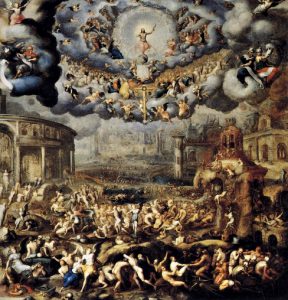We are excited and looking forward to preparing for this Advent, which requires intense prayer and penance, for we are warned, “Beware that your hearts do not become drowsy from … the anxieties of daily life….” (v.34) We have to give ourselves time to reflect and deeply process our thoughts about the meaning of Advent. The word Advent, from the Latin word “Adventus,” means coming. We know that what we are preparing for is the “Coming,” which is not solely the remembrance of the coming of Jesus but our coming back to Him with a profound connection to the nativity of the Lord.
The liturgical readings on this first week of Advent give us HOPE. You have seen the symbolism of lighting the first candle of the Advent wreath to set our minds that God will certainly fulfill His promise to us.
Advent is also reminds us of our present situation. We are still dark in darkness, still night. We still indulge in quarreling and jealousy. The epistle taken from the Letter to the Romans, St. Paul intends to give us “night vision” to see ourselves that we are still living in darkness.
When we wake up, we get dressed. St. Paul tells us what to wear: “let us put on the armor of light” (v.12); and “put on the Lord Jesus Christ (v. 14). Why do we need yo out an armor? According to history, men engage in battle need an armor for protection. It’s the soldiers who put on their armor and their weapons. The image tells us that we’re in the middle of conflict; instead of fighting each other, we need to unite against a common enemy. St. Paul names the enemy as “not flesh and blood,” but our enemy is Satan.
First, as Catholics, we are never to consider other people as our enemies, no matter how bitter the divisions in the church may be, nor how painful our experiences. Rather, we are to fight against the destructive powers that enslave and divide people. That might be a history of mistrust and injustice, addictions, thirst for revenge, prejudice and fear, greed, and so forth. St. Paul calls these “the works of darkness,” identified with the “the desires of the flesh” (Gal 5:19-21). These works of the flesh destroy our fellowship and our witnessing. When we engage in battle against such destructive powers, we fight for the unity of the church.
Second, the clothing ourselves in the armor of light is, “put on the Lord Jesus Christ.” Here, the imagery of clothing points to the moment of baptism. We recall “For as many of you as were baptized into Christ have put on Christ.” (Gal 3:27) This language of “putting on” a person could be meant that indeed, for those who have put on Christ, Christ’s destiny becomes our own identity.
The gospel today, taken from St. Luke is very hard to understand because of the many symbolisms and signs that we must comprehend. Our deep prayer and reflection will definitely lead us by the Holy Spirit to grasp its meaning.
First, when we speak about the glory of God’s coming, we imagine that everybody seems to be trembling in fear. Indeed, Jesus’ coming would be a magnificent event and the passing of this world becomes dramatic; however, Jesus wants us to be calmed by listening to Him. We focus on raising our hearts and minds with much anticipation, but for those who are not paying much attention, instead of enjoying they succumb to fear and anxieties in life.
Second, in the context of the gospel, Jesus wants us to simply be attentive to His warnings. This gospel pericope does not say it would be the end of the world. Our attention to Jesus might be ruined by what is happening around us, like chaos, disorder and absorption of all kinds of noise. It is more appropriate to focus on Jesus to understand the signs and warnings. It must be intensified by integrating our moral values and actions which conform to Him.
Third, this pericope of the gospel doesn’t reveal the end of the world per se; however, we are often instructed to be vigilant and be attentive in watching what’s going on around us and in the world. The right attitude towards our life’s journey would be trusting in God’s promise.
May these readings inspire us with God’s grace according to right living and faith as we await His coming to be real. Our way of overcoming fear and anxiety comes from having to let go of knowing exactly how and where we are to stand before the Son of God. How can I live a life of total trust in the Lord? Am I confused and becoming afraid? Do I really accept that God accompanies me in my daily life, helping me feel secure and safe?
Let us pray that we grow in the enjoyment of Advent, not being left behind and lost. If we neglect to grasp the true meaning of this season, then we might not simply appreciate the significance of Christmas.
God bless you,
Fr. Arlon, osa

